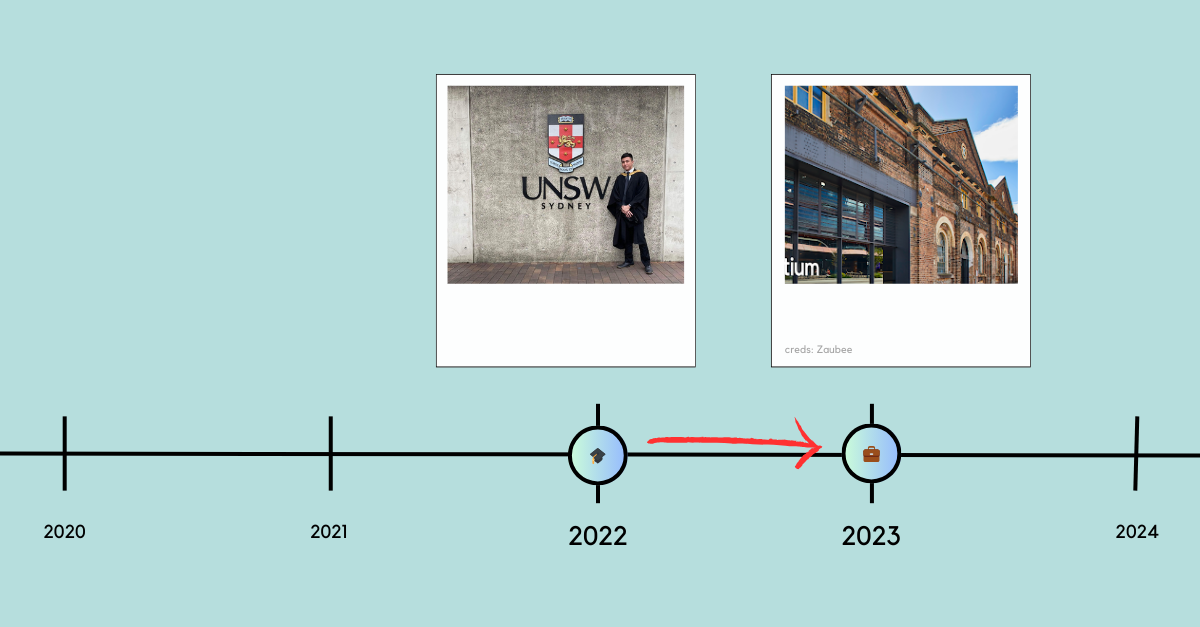Navigating the transition from Uni to a Data Analyst career
Posted on: February 2, 2024
Post Category: Professional Development

Doing data analytics at work is kind of a different ball game, to say the least – compared to doing it at Uni.
For context, I’ve worked at Quantium for about a year now, as a graduate data analyst, and prior to that, I studied at UNSW and eventually graduated at the end of 2022.
This post will go through some of the challenges, and (more broadly) some of the things I’ve experienced while making the transition from Uni to my full-time analyst role.
I’ll go through the simple things like settling in, and the more complicated things like (working towards) excelling as an analyst.
About making the transition from Uni to full-time work in general…
1. Getting used to the workday structure.
People say that full-time work is a bit better because there’s a bit more structure – working 9 to 5.
But with Uni, I lowkey miss the ability to do things when I want to.
Sure, you could study late hours in preparation for an exam, but I had the flexibility to do fun things on weekdays and… not show up to classes sometimes.
So getting used to working 5 days a week, during the standard working hours, was a bit of a challenge and it took a little while. I’m not a great morning person, and sometimes I need to take a nap during contact hours…
But the great thing with my company is that they take a more progressive approach to working. Most people at the company take a hybrid form of working. There’s no expectation that you have to be at your desk all day while in the office OR at home. And people in the office are always about – getting coffee, going for walks with their colleagues, buying things in preparation for social events, etc.
There’s a pretty good flexible working policy at my company as well, where employees can work from anywhere. And the members of my team generally understand that there are things that just happen during the traditional working hours – appointments, other responsibilities, and even mental-health related things.
The most important thing I learnt while getting used to the workday structure is to cover the fundamentals. If you’re working for a more-progressive company:
- You don’t have be online during all your standard contact hours, but be available for most of them.
- You don’t have to work all your required hours, but you need to break down tasks and do what’s required to manage your stakeholders’ expectations – that includes the project work, communication, etc.
2. Getting used to NOT hitting the ground running.
The first couple of months was basically learning the ropes:
- learning about the tech stack used,
- learning about how files are organised in the shared drive and how to navigate them,
- learning about the different datasets, workflows and reports.
I started to learn the fundamentals of the team, and I was basically in the trenches doing development work – work allocated by my manager, to handle requests and matters he was involved with.
The next couple of months will be when you start to lead projects – at least after you put your hand up and say you’re willing to stretch yourself and work with a lot of autonomy.
For these projects, you’ll start managing stakeholders, getting their requirements, developing things for them, getting their feedback and managing their expectations throughout the process. And *only* then, you start to learn the interpersonal skills you need to be a good analyst.
I mean, I did start at the company as a *graduate* data analyst (what did I really expect?)
But it was good to be reminded from my first-hand experience…
Doing full-time work post-Uni is not a quick process; it takes time before you (climb the ranks) and make an impact. Because it takes time to understand the business, what it needs and what you can do to service that need.
Have patience and be prepared to learn heaps, regardless of what you already know.
3. Getting used to asking questions – no matter how dumb you think they are.
During the early months, I took the time to understand manager expectations and asked heaps of questions.
But if I had to go back, I’d ask questions more – regardless of how I was feeling.
Sometimes I felt like asking questions would expose me as someone who pretends to know what he’s doing or pretends to make progress. But at the end of the day people are willing to help (and the work needs to get done).
You will meet people who are super smart – this could be other graduates in your cohort, or your manager. And they will have the expertise or business/domain knowledge you need access to.
Don’t be afraid to probe them.
About making the transition from Uni to being a data analyst…
1. Getting used to handling real-world datasets (with the context in mind).
When you work with datasets at Uni, It’s easy to clean data by imputing the mean, or using a model and imputing the output of that model.
These might make sense when it comes to working with data with little contextual information.
But when you work a job as an analyst, this will never be the case.
When you work with datasets as a job, there will always be a reason why a value is what it is. Nulls? Duplicate values? Values that don’t make sense? There must be a reason why. And once you diagnose the reason, only then can you pick the most appropriate way to clean the data.
Removing records and imputing values into missing cells has good intent. But when doing these things on a real-world dataset, for the sake of “cleaning” it, it tampers your data if anything.
When you work as an analyst, you realise it’s not about what seems the most “accurate” (like at University), it’s about asking your stakeholders/manager and letting them help inform you how to handle those issues.
But rant aside, once you do full-time work as an analyst, you will work with real data and work on very impactful projects for your business/clients. So the work is pretty engaging in that regard.
2. Learning that tools aren’t everything – and that you’ll learn more regardless.
Regardless of the tools you already know, you will probably learn more or revisit the ones you’re already confident in.
When you’re studying or hearing about being a data analyst, you might have some expectation that you’ll be using Python, SQL, Power BI or what have you…
That is true to some extent, but at the end of the day being a data analyst is not about knowing specific tools, it’s about delivering business value using data.
If there’s something that your team would like to achieve, and it can’t be done with the foundational data analytics toolkit (Python, SQL, Power BI, etc.), you will be learning a new skill.
And if there’s something that a stakeholder has asked for, and they would like the results accessible through Excel, you will probably use Excel (unless you recommend and prove that another tool is better for their use case).
3. Getting used to communicating.
Some of the projects I worked on went for months. And some of the things I built weren’t used as frequently as I’d like them to.
To mitigate those issues, you have to be a good communicator. You have to be a good partner with your stakeholders, to work with them and to arrive at the best outcome.
Doing data analytics is more than just crunching numbers and working with shiny tools. You gotta talk to people to know what they want and how they will receive specific types of information. You gotta get familiar and build trust.
Value doesn’t come from building cool stuff. It’s about building things that people actually want to use.
If you have any questions or would like to have a chat, or you would like to see more data analytics content, do follow me or reach out on LinkedIn.

About the author
Jason Khu is the creator of Data & Development Deep Dives and currently a Data Analyst at Quantium.